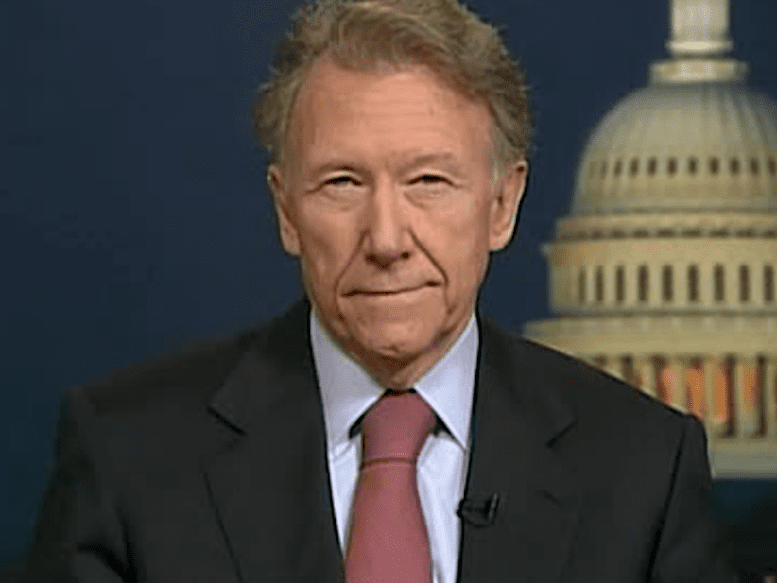Neighbors & Legends: Jim Hoagland
By • July 12, 2023 0 1927

Meet a Georgetown neighbor who was face to face with Saddam Hussein, Muammar Gaddafi and Vladimir Putin.
Jim Hoagland may not even be the most famous journalist on his own block, but the two-time Pulitzer Prize winner from Rock Hill, South Carolina, is one of the most esteemed international reporters of his era.
Hoagland has been a Georgetown resident for nearly 30 years, saying his wife, author Jane Stanton Hitchcock, was “the one who really developed a love for this house.”
Hoagland’s East Village block contains enough journalistic firepower to start a newsroom, including famed reporter Bob Woodward, NPR’s Mary Louise Kelly, Financial Times Bureau Chief Edward Luce and iconic Baltimore Sun columnist Jules Witcover. But it’s Hoagland’s incisive observations that got him access to some of the most powerful and controversial leaders of the late 20th and early 21st centuries.
Woodward in particular is an admirer of his long-time colleague having “worked together [with him] at The Washington Post for over 50 years.” Woodward said of his neighbor and fellow writer, “Jim Hoagland is a truly great journalist — independent and does his work based on his own in-depth reporting. He understands diplomacy like no other reporter and realizes intensive listening and understanding of all sides is essential.”
Greeting me with a gentle southern accent, a firm handshake and a glass of water, Hoagland and I sit in his gracious living room lined with books. He talked about the journey that placed him at some of the most important international events of our time.
Starting his career right after leaving the University of South Carolina, he worked at local newspapers in the Palmetto State. He also lived in Europe for many years, spending time in Aix-En-Provence, Paris and Germany, where he spent two years serving in the U.S. Air Force. He came back to the United States in 1966, where a fateful conversation would change his career forever.
On a trip to Washington to inquire about a job working for Congressman Tom Gettys of his native South Carolina, the brother of a friend introduced him to Washington Post Executive Editor Ben Bradlee. He only talked to Bradlee for 10 minutes, but that was enough time for both men to commit their futures to each other. Sitting back in his chair with a smile, Hoagland described Bradlee as “magnetic” and said, “You knew you wanted to work for this guy.” This started a lifelong friendship for both men and a career at the Post that lasted over half a century.
Hoagland has had a chance to interview some of the most consequential leaders in the world. One interview that stuck with him was with Iraqi leader Saddam Hussein. Interviewing the tyrannical dictator was like, “sitting across the desk from a coiled Boa Constrictor.” When he went into Hussein’s palace for the meeting, he said, “they started walking us down this long hallway escorted by a military guide. It became clear the guide didn’t know where he was going. All of a sudden, another guard stops and takes control of us to take us to Saddam. Before seeing him, we had to wash our hands with this blue liquid because they were afraid we were going to kill him.” Steady nerves through such situations are part of what made Hoagland such a respected reporter. His career has put him in close quarters with leaders as wide ranging as Putin, Mikhail Gorbachev, Nelson Mandela, as well as many American presidents and secretaries of state.
Another example of Hoagland’s storied career is when he talked to Libyan leader Muammar Gaddafi. After raising tough questions at a press conference about Black September and the Jordanian Civil War, the dictator had an aide pull him aside. Hoagland said that was “about the only time I have ever been nervous about meeting somebody.” Gaddafi said, “Why do you drink poison?” After asking for clarification, he figured out that Gaddafi was talking about drinking alcohol. He responded by saying, “How do you know I drink alcohol?” That type of understated fearlessness personifies Hoagland.
Unsurprisingly, Hoagland said the stories he is most proud of are the two for which he was awarded Pulitzer Prizes (in International Reporting, and Commentary.) His first came in 1971, when he wrote about apartheid in South Africa. Hoagland recounted in an NPR interview in South Carolina that it struck him how similar apartheid was to the segregated South during his childhood. The other, in 1991, was for a 10-part series he wrote on the lead-up to the First Gulf War and the problems facing Mikhail Gorbachev. According to Hoagland, “the way I covered Gorbachev, I thought was an interesting story and a very consequential one.” The Soviet Union collapsed that same year.
Sitting by the pool and reading with his dog Chloe by his side, Hoagland can reflect on a remarkable career that has informed millions of readers and influenced policy makers all over the world. As Georgetowners, we are lucky to call Jim Hoagland our neighbor.

